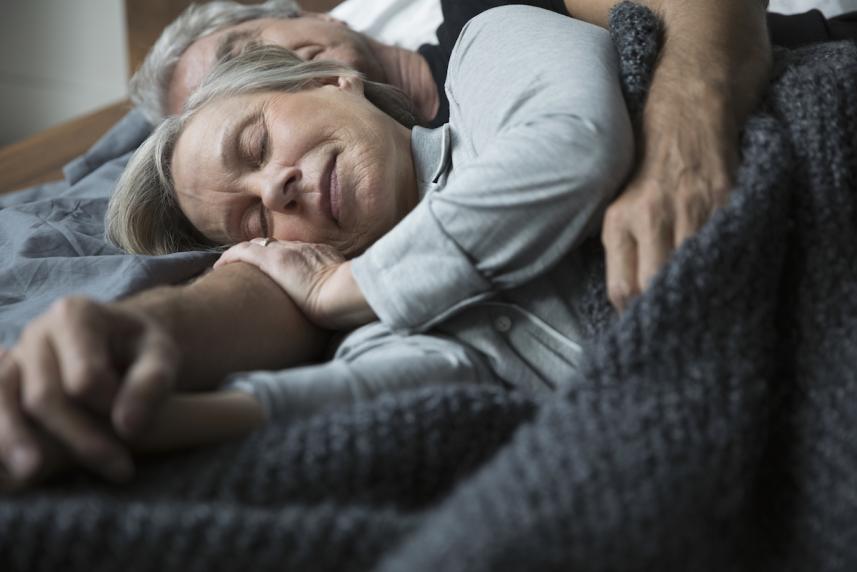Sleep and urinary incontinence
Nighttime treks to the bathroom are no fun—and they may point to more serious health problems.

Waking up once during the night to use the restroom is completely normal. Two or more times on a regular basis? That’s another story. You may have nocturia, a fancy term for excessive nighttime urination.
Nocturia is a silent struggle for many adults. It affects upwards of 50 million Americans, yet only 10 million are diagnosed with the condition. (And only 1.5 million receive specific therapy for it.) Also, one in three adults over 30 make at least two trips to the bathroom every night.
And while nocturia alone is cause for concern, studies show that the condition is a contributing factor to other health woes, including fatigue, depression, and even diabetes.
In other words, when it comes to nighttime urges to go, it’s not a good idea to try to tough it out.
Here’s a closer look at why these middle-of-the-night urges are so strong, and why it’s important to take steps to get control of your bladder—for the sake of your overall health. Plus, some proven strategies to help you sleep through the night.
Why you have to go more overnight
There are a few culprits to blame. One is the hormone card you’ve been dealt. Women with nocturia often produce more than 33 percent of their total daily urine in the wee hours of the night, an imbalance in part caused by age-related hormonal shifts, according to a study from the University of Pittsburgh School of Medicine, published in the Journal of Urology. Caffeine, drinking too much before bed, or alcohol can also play a role.
Extra nighttime trips to the bathroom are also tied to a leaky bladder, or urinary incontinence. For example, in a Washington University School of Medicine study, 86 percent of adults who had an overactive bladder also made at least two bathroom visits per night, compared to 13 percent without the bladder problem.
Nocturia can also be caused by a urinary tract infection, an enlarged prostate gland in men, kidney problems, diabetes, sleep apnea, congestive heart failure, and medications such as diuretics.
With so many possible sources, you’re smart to have a frank conversation with your doctor, who can tease apart the root cause of your nightly urges and get you set up with the right treatment.
Nighttime urges and your overall health
Not surprisingly, a restless bladder interferes with sleep quality. That, in turn, puts you at an increased risk of problems like daytime drowsiness, fuzzy thinking, fatigue, depression, and even obesity, diabetes, and weakened immunity, according to the National Association for Continence.
Among the elderly with balance problems, nocturia plays an indirect role in boosting the odds of falls and fractures, since getting up several times a night increases your chances of slipping. In fact, experts at the University of Pennsylvania found that 48 percent of women with nocturia and nighttime incontinence were at a high risk of falling.
Four things you can do right now
To help tame your nocturia symptoms, try switching up a few of your daily habits:
#1 - Shift your drinks. Have the fluids you need to stay hydrated during the morning, afternoon, and early evening—and don’t have beverages within two hours of bedtime. It’s also smart to skip caffeine and alcohol in the evening, as they can act as diuretics that send more urine to your bladder. Keeping a diary of what you drink, how much, and when you drink it could help you spot late-day sips that may be contributing to your nighttime urges.
#2 - Cut back on salt. In a 2019 Japanese study of 321 women and men with salty diets and sleep problems, those who cut back on sodium reduced overnight bathroom runs from an average of 2.3 per night to 1.4.
#3 - Put your feet up. If you have swelling in your feet, ankles, and legs due to fluid buildup, prop up your legs in the evening. Otherwise, the fluid will be reabsorbed into your bloodstream while you sleep, adding to your urine output. Wearing compression stockings and/or taking an afternoon nap can also help with this concern, according to the National Association for Continence.
$4 - Set yourself up for a great night’s sleep. A good sleep routine meant fewer wake-ups to pee among participants in a University of Pittsburgh study, published in the Journal of the American Geriatric Society. What does that look like?
- Move your daily workout to the morning or early afternoon (the adrenaline jolt can linger and keep you awake).
- Keep your bedroom cool and dark (any source of light can trigger your wake cycle).
- About an hour before you plan to turn in, power down your computer, smartphone, and TV (the blue light can also keep you in wake mode).
- Create a relaxing before-sleep ritual (everyone is different, but some ideas include reading a novel, calling a friend or catching up with your partner, or doing a hobby).
- Go to the bathroom just before you tuck yourself in.


